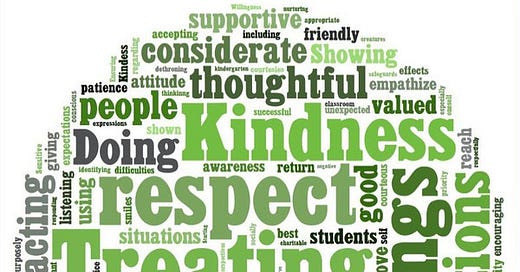Mensch•Mark For Elul 28: Love of Being Straightforward - Ohev et HaMaysharim
We even need to be careful about saying GOOD things about people, especially when there is an ulterior motive.
About the Mensch•Mark Series
The Talmudic tractate Avot, 6:6 provides a roadmap as to how to live an ethical life. This passage includes 48 middot (measures) through which we can “acquire Torah.” See the full list here. For each of these days of reflection, running from the first of Elul through Yom Kippur, I’m highlighting one of these middot, in order to assist each of us in the process of soul searching (“heshbon ha-nefesh”).
Today’s Middah:
Love of Being Straightforward - Middah Ohev et HaMaysharim
URJ’s Take:
Text
"What is the straight path a person should choose? That which does him/her honor and wins him/her the esteem of others." (Avot 2,1)Commentary
This middah reminds us that we are constantly required to make choices related to our behavior. It encourages us to develop a love for doing things in a straightforward way. Our text, taken from Pirkei Avot, offers us some guidelines for making those choices based on honor and esteem.The commentators of this middah propose that it refers to the way in which we interact with people. It encourages us to deal in a straightforward fashion with the hope that others will respond in the same fashion. Midrash Shmuel suggests that an authentic student of Torah loves straightforwardness and does not flatter others. Flattery is considered a distortion that undermines the intellectual honesty needed for success at learning. (Pirkei Avos Treasury, p.420)
Jewish tradition offers many warnings about dispensing compliments or flattery. As the Talmud teaches, "A person should not [excessively] compliment another [who is not present], for though he will start by speaking positively, the conversation could soon turn to the person's negative traits." (Bava Bathra 164b)
Another explanation offered by Midrash Shmuel for ohev et hamayasharim is that it refers to someone who loves straight thinking. The rabbis argue that convoluted logic does not lead to clear conclusions in the study of Torah. (Pirkei Avos Treasury, p.420)
Rabbi Susan Freeman points out that how we use language should be intentional, something we control. The goal is to choose deliberately how we speak and what we speak about. (Teaching Jewish Virtues, p. 149)
Politicians are notorious for 'beating around the bush.' When they are asked a question that they do not wish to answer, their response is often a rambling, unfocused attempt to avoid the question. It is often difficult to get a straightforward answer. Perhaps this is one of the reasons why some people find it difficult to trust certain politicians. The same holds true for personal relationships. How often have you become frustrated because you've asked someone a direct question, and you can't seem to get a direct response?
MARLENE MYERSON
My Take: The Chafetz Hayyim vs. Eddie Haskell
In a world filled with two-faced sycophants, it is hard to avoid falling victim to the Eddie Haskel affect. In the old show Leave it to Beaver, Eddie was known to ingratiate himself to the parents before bullying the child. In his case, flattery got him somewhere. So, bad gossip notwithstanding, we even need to be careful even about saying good things about people, especially when there is an ulterior motive.
The Chafetz Hayyim wrote a prayer, which he recited each morning to help him maintain vigilance in Shmirat Ha-lashon (guarding one’s tongue) . Here’s an excerpt:
Gracious and merciful God, help me to restrain myself from speaking or listening to derogatory, damaging or hostile speech. I will try not to engage in lashon ha-ra (destructive language), either about individuals or about an entire group of people. I will strive to say nothing that contains falsehood, insincere flattery, scoffing or elements of needless dispute, anger, arrogance, oppression or embarrassment to others. Grant me the strength to say nothing unnecessary, so that all my actions and speech cultivate a love for your creatures and for You.
If insincere flattery is a form of “bad language,” Lashon Ha-ra, perhaps even sincere flattery can be too.
See The Chafetz Chayim’s Laws of Lashon Ha-ra, 9:1-3 - reprinted below:
If only Eddie Haskell had been so sensitive in choosing his words.
At the beginning of the Amida we whisper a verse taken from the psalms:
“Oh Adonai, open my lips that my mouth might speak Your praise."
Every time I say that prayer, I allow those words to roll off my tongue slowly. Like the shofar, our voices are echoes of divinity; each utterance contains a whispering remnant of the thunder at Sinai. Let that thundering whisper roll from our lips as we pray this coming week. May God grant all of us the courage to do something outlandishly good and decent these next days, and may our own words inscribe the entire world for life in the year - and the journey - that we have just begun.







